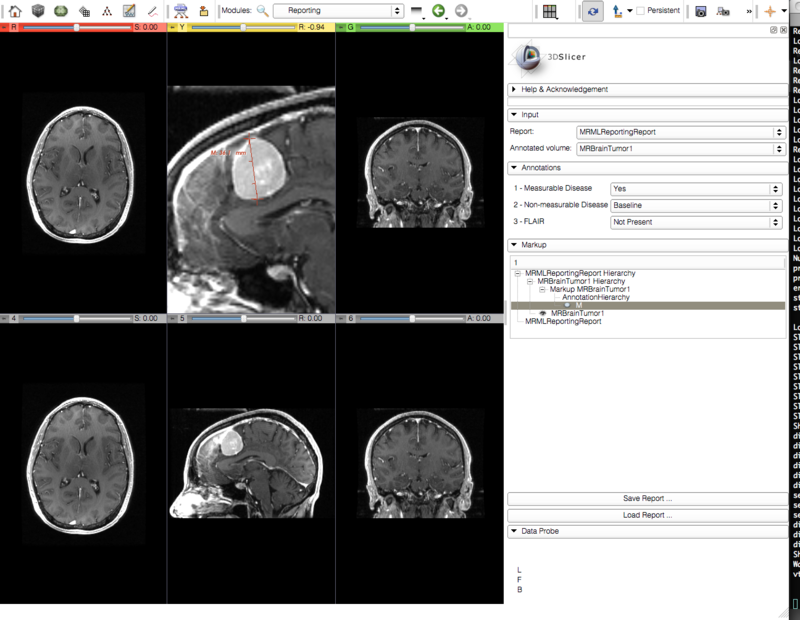Projects:QIN:3D Slicer Annotation Image Markup:Design and Implementation
From NAMIC Wiki
Home < Projects:QIN:3D Slicer Annotation Image Markup:Design and Implementation
Back to Projects:QIN:3D Slicer Annotation Image Markup
Slicer Reporting Module
Contents
Terminology
- Annotation: textual structured description of the finding. How do we differentiate those from Slicer Annotations?
- Markup: visual cues placed over the image to assign annotations to image features
Implementation considerations
- We will use existing annotation hierarchies to organize the AM. AM will be organized into findings that will be located in the hierarchy under a particular volume. Each volume can have separate findings. Each finding can be assigned to only one volume.
- We are focused on the support of markup in 2D slices; 3D view annotations are secondary.
- The functionality needed to support connection between the data and AM will be added to Slicer core. User-level interactions will be available in a separate module.
- Markup is defined relative to the active slice of the active volume. AIM/DICOM SR do not have a notion of 3D coordinate space (needs verification). Slicer annotations will be restricted to be in-slice for the use cases of this project.
- Annotations text can be stored in the "description" field of the Slicer Annotations in the XML format, as determined by the annotation template used.
- Annotations text can be formatted and visualized using HTML as a report in the Slicer Annotation description area.
Input from Justin Kirby:
- allow loading reports, editing, and saving again
- allow multiple reports per volume
- allow multiple observers per volume
- include points (use case: renal application in preparation)
Markups to be supported
These will be decided based on the existing requirements from the use cases provided by the QIN community, and based on the existing capabilities of the AIM-enabled tools (OsiriX and ClearCanvas TCGA workstation). The tentative list in the order of priorities (not finalized):
- Point
- Ruler
- 3d segmentation
Example AIM templates
AIM template schema: File:AIM Template v1rv18.xsd.zip
- RANO File:RANO4 AIM template.xml.zip
- BRCA File:BRCA AIM template.xml.zip
- VASARI File:VASARI AIM template.xml.zip
GUI
User-level (implementation level) Workflow
Creation:
- 1 choose volume being annotated ( implementation --> create corresponding node in the hierarchy, initialize slice viewers, rotate to slice plane)
- 2 select annotation template (default: finding? option to load template?) ( --> populate the GUI with the annotation template contents)
- 3 populate template ( --> NA)
- 3 scroll to the slice
- 5 add new finding into the hierarchy ( --> need to have a button to add new finding? all subsequent markups will go under that tree element)
- 6 place markups ( --> support markup type selection from slicer toolbar? add extra markups compared to Annotation module, and remove them when user leaves the module? for 2d/3d ROIs -- invoke Editor?)
- 7 assign text (annotation of annotation in AIM?) -- all go under the active annotation hierarchy node
- 8 done: save/export results ( --> Slicer save dialog? save annotation as AIM XML or as "AIM-light"? include name of the observer, creation date)
Loading:
- may distribute the template used in annotation together with the scene or not?
- if we allow editing of the annotation/markup, when saving need to update this (think about data provenance/revision history later)
Comments:
- User can switch to multiple volumes over the annotation period. This is ok, separate hierarchy element for each volume.
Implementation task list
Finalized:
- Add functionality to track the UID of the DICOM volume based on the current volume and IJK coordinates
- Add links between AM (hierarchy? finding?) and parent volume
- Start work on the module (loadable module, python GUI scripting)
- add "observer" name as a Slicer setting, or query from the system settings
- Annotation template GUI populating
- New/missing markup widgets: we will not be adding any new widgets as part of this project
Progress
Source code on github: https://github.com/fedorov/Reporting
Week of Feb 2 task list
- Andrey:
- disable GUI elements to make workflow more intuitive
- work on RANO MRML node
- add category to the module (Informatics)
- add extra handling for slice nodes: detect acquisition plane and rotate to volume slice
- handling of markups placed not on the volume
- start looking into AIM export
- Nicole:
- hierarchies
- consistent user experience (no duplication of hierarchy/volume nodes, correct parenting)
- show only active report in the widget
- markup
- add handling of "eye" visibility icon for markup elements
- hide markups that do not belong to the active report
- make sure assumption of single volume in the report does not cause us difficulties later
- hierarchies
Completed tasks
- Add functionality to track the UID of the DICOM volume based on the current volume and IJK coordinates
- Add links between AM (hierarchy? finding?) and parent volume
- Start work on the module (loadable module, python GUI scripting)
- decided: we will not be adding any new widgets as part of this project
To be resolved
- add "observer" name as a Slicer setting, or query from the system settings
- Need to support MRML scene round-trip for Reporting.
- add new layout? (2 over 2, no 3d viewer)
- serialization
- generic qMRMLReportingAnnotationWidget and AIM template support
